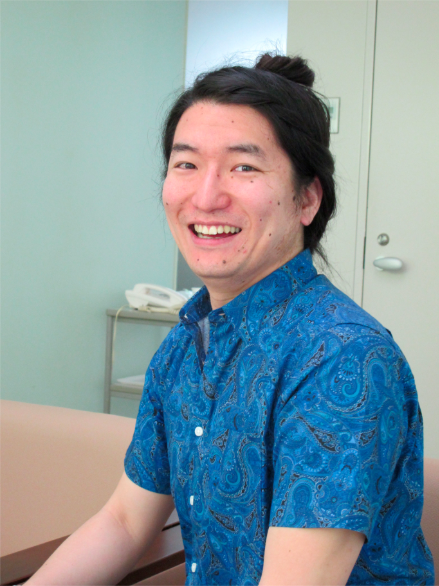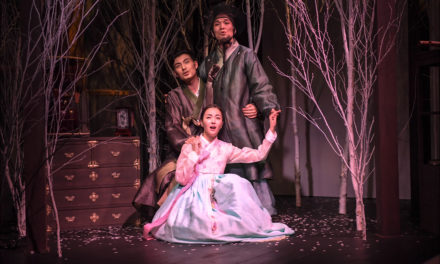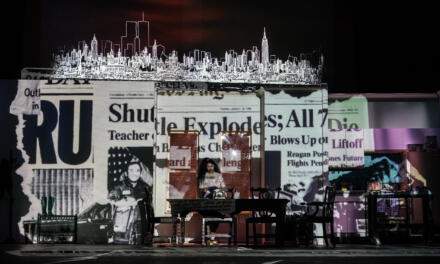The first thing Yojiro Ichikawa said when we sat down for our recent interview in a Tokyo rehearsal studio was, “Shall I speak in English?”
For the director of the Andrew Lloyd Webber musical Tell Me On A Sunday, which has its Japan premiere next month, that was a natural question, given that he is virtually bilingual and he knew I lived a long time in London.
In the event, I opted for Japanese—first asking the fast-rising 34-year-old dramatist how he came to be so good at a foreign language many Japanese study for years but can hardly speak at all.
The answer turned out to be even more colorful than I’d expected, as Ichikawa recounted how he was born in Houston, Texas, where his father’s trading company job had taken him at the time. Then at age 3, Ichikawa was brought to Japan before the family moved to Sydney when he was 8.
“I got my education in Japan from junior high school to university,” he said, while modestly omitting to mention he graduated with top honors from the aesthetics and art theory department of the University of Tokyo — though he did acknowledge, “The Western environment in my early days certainly influenced me a lot, especially on the aesthetic and artistic side, and with such things as such color sense.”
Then, touching in passing on the supposed subject of our interview—the 70-minute, one-woman musical Tell Me On A Sunday—Ichikawa continued,
“Coincidentally, thanks to the upbringing my mother gave me, I enjoyed various types of performing arts as a child. My favorite was the 1939 MGM musical The Wizard Of Oz, starring Judy Garland. So now it comes naturally to me to stage music and dance in a theater.”
 In addition, after returning from Sydney at age 12, he said he began translating theater and movie subtitles and dubbing from English to Japanese—which made him realize how “poor and casual” many others often were.
In addition, after returning from Sydney at age 12, he said he began translating theater and movie subtitles and dubbing from English to Japanese—which made him realize how “poor and casual” many others often were.
“Then, when I went to see an all-Japanese production of Les Miserables a few times during its long Tokyo run in the 1990s,” he recalled, “I noticed that each of the two different casts used some significantly different translations of the English—seemingly depending on the actors’ feelings for the Japanese language.
“That made me realize the importance of a careful translation in allowing a play to really shine, and I continue to be amazed about the richness of Japanese and how the selection of translation words is crucial to the success of a work.
“This revelation has been my guiding principle as a translator and director ever since.”
En route to that now sparkling joint career, however, Ichikawa had to serve his time—first as a stagehand with the leading Tokyo-based showbiz and musicals organization the Shiki Theatre Company, where he was soon involved in production. But then, he said, he “realized he had to take action to avoid being totally exhausted by the Japanese work regime.”
So to stave off that fate, in 2010 he went to London after getting a place on an overseas training program run by the Agency for Cultural Affairs.
There, besides “learning how to read plays properly” at a top-class drama school, he also attended the Arts Educational School run by the musicals mogul Andrew Lloyd Webber and took part in workshops at the National Theatre, the Young Vic, and the Complicite physical-theater company.
Since then, he’s mostly been active as a director and assistant director in England, and his stagings of the musicals From Up Here and Peter Pan: A Musical Adventure were both hits in 2014.
As a result, his upcoming production of Tell Me On A Sunday may (or may not, I hope) be a rare chance to see one of Ichikawa’s works here in Japan.
Often described as a “song cycle,” the musical is all about a young British woman named Emma who moves to New York to make a new life for herself—only to lose sight of her aim as she’s sidetracked by a string of boyfriends. Then, as she wakes up to what’s happening to her, the tension builds as she strives to revive her dream.
Following the musical’s 1979 world premiere at the annual Sydmonton Festival in southern England, one of its songs—Take That Look Off Your Face, with lyrics by Lloyd Webber’s collaborator, Don Black—was recorded by the work’s star, Marti Webb, and rose to No. 3 in the pop charts in 1980.
Since then, the play has often been revised to keep it abreast of the times, and Ichikawa has drawn on the text from the latest 2016 English version to create a new Japanese show with his long-term friend, the top musicals actress, Megumi Hamada.
“The original one focused on Emma’s romantic tangles, but I thought today’s young women, and also men, wouldn’t be satisfied with that simple kind of thing,” the director said.
“Also, Hamada once acted the role of Nala, the Queen of Pride Rock in The Lion King, and she was the heroine, the green witch Elphaba, in Wicked, so I was never going to make this just an old-fashioned romantic play.
“Instead, my concept was to present a woman’s self-reliance story. Hence, while we follow the ups and downs of the heroine’s love life, we also try to describe her growth as a mature woman.”
Yet with this storied piece surely set to delight Tokyo audiences, I was intrigued to know why Ichikawa said he would soon be returning to London, and what he regarded as the pros and cons of theater there and here.
“These days, we have more variety of musicals here than 10 years ago, and people are finally paying attention to Japanese ones as well as imports, so it’s a great time for musical creators,” he replied.
“Consequently, I think producers should take a long-term view of the theater business. Instead, to get instant returns, they often cast celebrities and ikemen (good-looking young men) to be sure of selling all the seats, and they don’t seem to care so much about the overall quality.”
Then, perhaps even more crucially, he observed, “Of course here there are almost no proper reviews in the major media, whereas theater people in London are always striving to create great and meaningful productions — and they know their works will be rigorously evaluated by the critics.
“Also, Japanese theaters often only care about themselves individually, and they’re not concerned about the wider theater scene.
“However, I think we should all be getting together and livening up the theater world. After all, it should be an area in which artists and audiences engage in healthy debate as a matter of course.”
Tell Me On A Sunday runs June 10-26 at the New National Theatre Tokyo, a two-minute walk from Hatsudai Station on the Keio New Line. For details, call 03-3490-4949 or visit hpot.jp.
This article first appeared on The Japan Times on May 24, 2016, and has been reposted with permission.
This post was written by the author in their personal capacity.The opinions expressed in this article are the author’s own and do not reflect the view of The Theatre Times, their staff or collaborators.
This post was written by Nobuko Tanaka.
The views expressed here belong to the author and do not necessarily reflect our views and opinions.


















